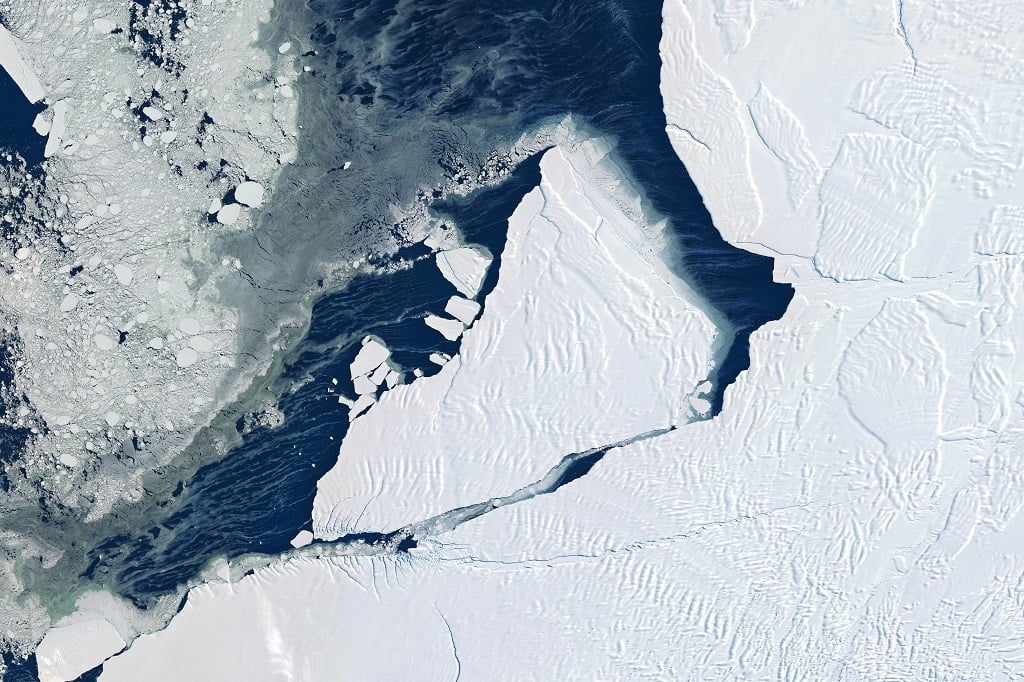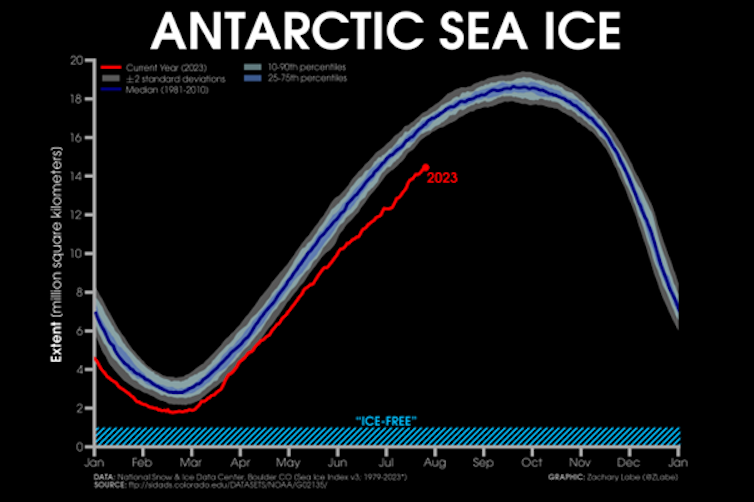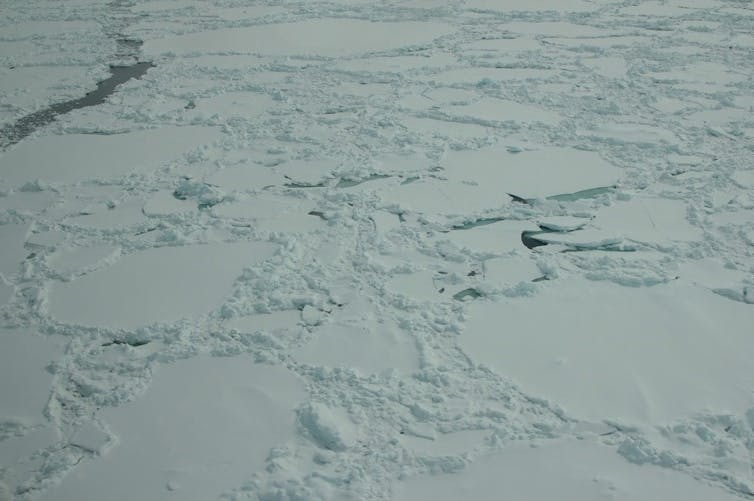
Floating sea ice is a pivotal climate puzzle piece, without it global temperatures would be warmer. The loss of Antarctic sea ice matters for the whole planet, write Ella Gilbert and Caroline Holmes.
- For climate change news and analysis, go to News24 Climate Future.
Deadly heatwaves, raging wildfires and record global temperatures are upon us. But far from the flames, at the southernmost tip of the planet, something just as shocking is unfolding.
It's Antarctic winter, a time when the area of floating sea ice around the continent should be rapidly expanding. This year though, the freeze-up has been happening in slow motion.
After reaching a record low minimum extent this summer there is now an area of open ocean bigger than Greenland. If the "missing" sea ice were a country, it'd be the tenth largest in the world.

Antarctic sea ice extent in 2023 compared to the 1981-2010 average. Zachary Labe
Who cares about Antarctic sea ice?
In the face of more immediate climate concerns, why does Antarctic sea ice matter?
Floating sea ice is a pivotal climate puzzle piece. Without it, global temperatures would be warmer because its bright, white surface acts like a mirror, reflecting the sun's energy back to space. This keeps the Antarctic – and by extension, the planet – cool.
Antarctic sea ice also plays a particularly important role in controlling ocean currents and may act as a buffer that protects floating ice shelves and glaciers from collapsing and adding to global sea levels.
In short, the loss of Antarctic sea ice matters for the whole planet.
READ | Warm water melts weak spots on Antarctica's 'Dommsday Glacier', say scientists
Southern sea ice: a short history
Every year Antarctic sea ice undergoes a transformation: from its summer minimum in February, its area increases more than sixfold during the winter freeze-up which reaches its height in September. A clear way to monitor the health of Antarctic sea ice is to track these peaks and troughs.
Records began in 1979 and until 2015, the yearly average extent of frozen sea around Antarctica was increasing ever so slightly. Yet in the past seven years, Antarctic sea ice has changed dramatically.

Floating sea ice near the Antarctic peninsula in December 2017. Ella Gilbert
After a record high two years prior, the amount of sea ice fell dramatically at the end of 2016 to a record minimum in February 2017. This was followed by successive low years with the southern hemisphere summer record again being broken in February 2022 and most recently, a new lowest extent of 1.79 million square kilometres being recorded in 2023, a fall of nearly 10% from last year's summer record.
Since February 2023, slow regrowth has meant sea ice has fallen further and further behind where it should be for the time of year.
And now, in July, what we're seeing is truly remarkable.
A complex picture
Antarctic sea ice, and how it's affected by climate change, has been so hard to understand because there are so many factors at play.
Wind patterns, storms, ocean currents and air and ocean temperatures all affect how much of the sea around Antarctica is covered by ice and they often push and pull in different directions. This means it can be hard to link the behaviour of Antarctic sea ice in any particular year, or over several years, to just one factor.
This complexity is behind the perplexing increase in Antarctic sea ice extent observed between 1979 and 2015, and what makes it so hard to understand current conditions.
Before 2015, contrasting trends in sea ice growth in different regions of the vast continent mostly counterbalanced each other. What's remarkable about 2023 is that these regional differences are largely absent.
How rare is it?
This year's record low summer minimum and record slow freeze-up are astonishing because they fall so far outside the range we have come to expect.
Antarctic sea ice varies a lot year-to-year, but even by Antarctic standards this is well outside the bounds of normality. Some experts have attempted to put a number on just how rare this would be without climate change and arrived at "a once in 7.5-million-year event".
However, while the current situation is certainly off the charts, those charts don’t go back very far, and so it's hard to make these sorts of statements with any real certainty.
Given how complex a system it is, we can't say conclusively whether the past 40 years (the period for which we have satellite observations) are an accurate reflection of the "natural" behaviour of Antarctic sea ice. In fact, there's good reason to think they aren't. Which makes it difficult to say exactly how unusual this year's values are.
However, while we may not be able to put an exact number on it, we know that this is a rare event.
READ | What is the highest temperature ever recorded in your country?
Is it climate change?
Compared with Arctic sea ice, the precipitous decline of which can be robustly linked to rising temperatures, Antarctic sea ice has proved more enigmatic.
In response to greenhouse gas emissions, models have long predicted a drop in Antarctic sea ice: a prediction that previously appeared at odds with the data.
As the ocean and atmosphere warm, we might expect sea ice sandwiched between the two to shrink. But as scientists have come to learn, Antarctic sea ice is more complicated than that.
Models seem unreliable on this topic, which means we still don’t know what Antarctic sea ice decline will look like. And while seven days may be a long time in politics, seven years is a short time when it comes to the climate.
It is too early to say conclusively whether the recent dramatic fall in Antarctic sea ice extent is simply a blip in the record or, as now seems more likely, the first sign of a longer-lasting reduction induced by climate change.
What happens in Antarctica doesn't stay in Antarctica
Regardless of the vagaries of Antarctic sea ice behaviour, the polar regions play a vital role in the climate system. And they are changing before our very eyes.
Antarctica isn't just for the penguins: it matters for all of us.

Don't have time to read about climate change as much as you'd like? Get a weekly roundup in your inbox instead. Every Wednesday, The Conversation’s environment editor writes Imagine, a short email that goes a little deeper into just one climate issue. Join the 20 000+ readers who've subscribed so far.![]()
Ella Gilbert, Climate Scientist, British Antarctic Survey and Caroline Holmes, Polar Climate Scientist, British Antarctic Survey, Associate Lecturer, The Open University
This article is republished from The Conversation under a Creative Commons license. Read the original article.
News24 encourages freedom of speech and the expression of diverse views. The views of columnists published on News24 are therefore their own and do not necessarily represent the views of News24.




 Publications
Publications
 Partners
Partners












